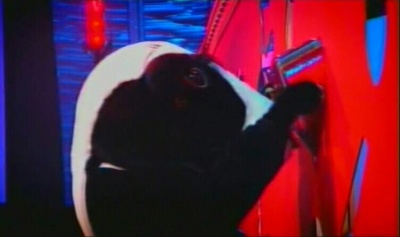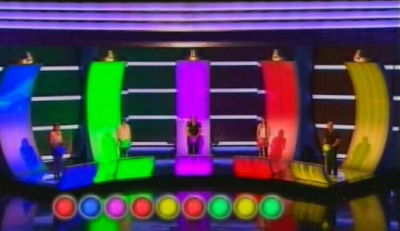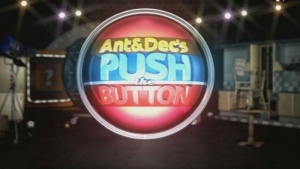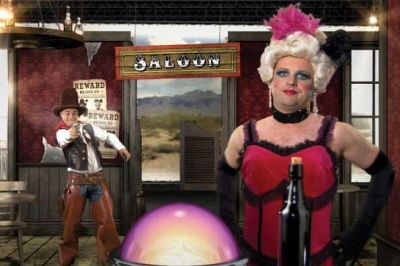Push the Button
(Pull the original pic out of the archive.) |
|||
| (11 intermediate revisions not shown) | |||
| Line 1: | Line 1: | ||
| + | <div class="image">[[Image:Push the button_2 title.jpg|300px]]</div> | ||
| + | |||
<div class="box"> | <div class="box"> | ||
| + | |||
== Host == | == Host == | ||
| Line 19: | Line 22: | ||
Messrs [[Ant McPartlin|McPartlin]] and [[Declan Donnelly|Donnelly]] return as two families of five play head-to-head to win thousands of pounds. | Messrs [[Ant McPartlin|McPartlin]] and [[Declan Donnelly|Donnelly]] return as two families of five play head-to-head to win thousands of pounds. | ||
| + | |||
| + | <div class="image">[[File:Pushthebutton titles saloon.jpg|400px]]''A still from the title sequence. Dec definitely drew the short straw on this one.''</div> | ||
The show begins with us being shown footage from earlier in the week when Ant and Dec went and knocked on the doors of the two families to let them know they would be competing. Cue lots of excitable screaming, shouting, hugging, and general merriment that does little but mildly annoy the audience. As each family member is introduced, we see a brief on-screen biography containing information we're really not interested in. Back in the studio, each family sits on a bench on each side of the studio. One bench is red, the other blue, however each team is only ever referred to by their family name. | The show begins with us being shown footage from earlier in the week when Ant and Dec went and knocked on the doors of the two families to let them know they would be competing. Cue lots of excitable screaming, shouting, hugging, and general merriment that does little but mildly annoy the audience. As each family member is introduced, we see a brief on-screen biography containing information we're really not interested in. Back in the studio, each family sits on a bench on each side of the studio. One bench is red, the other blue, however each team is only ever referred to by their family name. | ||
| Line 27: | Line 32: | ||
The first type of game is time-based, requiring one or two members of each family to complete a given task as fast as they can, as their money drains away. These tasks have included posting a series of items through the correctly shaped hole, stacking an over-sized wedding cake, or ranking different singers and PJ & Duncan by the amount of Number 1 singles they’ve had. The specifics vary by game, but the general concept of completing a task as fast as you can remains in each game. | The first type of game is time-based, requiring one or two members of each family to complete a given task as fast as they can, as their money drains away. These tasks have included posting a series of items through the correctly shaped hole, stacking an over-sized wedding cake, or ranking different singers and PJ & Duncan by the amount of Number 1 singles they’ve had. The specifics vary by game, but the general concept of completing a task as fast as you can remains in each game. | ||
| + | |||
| + | <div class=image>[[Image:Push the Button guinea pig.jpg|400px]]''This isn't [[Pets Win Prizes]].''</div> | ||
When played as one of the first three games in the programme, the time-based games tend to be played by one family then the other. However, no doubt to add excitement, the fourth and deciding game, which is always a time-based game, is played head-to-head. In this final game, there is also a time-out. When one family's money drains down to £25,000, they are timed-out. This means they can no longer play, and must wait to see if their opponents complete their task and win, or whether their opponents also time-out at £25,000, at which point a tie-break is played. At the time of writing, both teams timing out hasn't occured so we don't know what the tie-break entails. | When played as one of the first three games in the programme, the time-based games tend to be played by one family then the other. However, no doubt to add excitement, the fourth and deciding game, which is always a time-based game, is played head-to-head. In this final game, there is also a time-out. When one family's money drains down to £25,000, they are timed-out. This means they can no longer play, and must wait to see if their opponents complete their task and win, or whether their opponents also time-out at £25,000, at which point a tie-break is played. At the time of writing, both teams timing out hasn't occured so we don't know what the tie-break entails. | ||
| Line 34: | Line 41: | ||
The second type of game involves two players, one from each team, in turn, answering questions, or estimating a given total. Each correct answer, or closest guess allows the player in question to push the button, and deduct a certain amount of money from their opponents prize fund – typically £5,000. Like the time-based games, the specifics of the game vary, but the basic concept remains. Games of this type have included correctly answering how certain soap opera characters met their end, to estimating how many teeth appeared in a comically over-sized [[Simon Cowell]] mouth. | The second type of game involves two players, one from each team, in turn, answering questions, or estimating a given total. Each correct answer, or closest guess allows the player in question to push the button, and deduct a certain amount of money from their opponents prize fund – typically £5,000. Like the time-based games, the specifics of the game vary, but the basic concept remains. Games of this type have included correctly answering how certain soap opera characters met their end, to estimating how many teeth appeared in a comically over-sized [[Simon Cowell]] mouth. | ||
| + | <div class=image>[[Image:Push the Button simon cowell head.jpg|400px]]''Well, that's an image we're never going to erase from our heads.''</div> | ||
| + | |||
The third and final type of game involves one or more members of each family attempting to complete a certain performance task. Activities have included attempting to yodel or play the trumpet, or dance along to Alexandra Burke. Once the participating family members have each given their performance, the audience (well 100 of them anyway so the compliance message on screen tells us) vote on which they thought was the best. Whoever receives the highest percentage of the vote can push the button, and take money away from their opponents total, the amount being determined by the percentage of the vote they received. For example if they received 56% of the vote, they can deduct £5,600 from their opponent’s total. | The third and final type of game involves one or more members of each family attempting to complete a certain performance task. Activities have included attempting to yodel or play the trumpet, or dance along to Alexandra Burke. Once the participating family members have each given their performance, the audience (well 100 of them anyway so the compliance message on screen tells us) vote on which they thought was the best. Whoever receives the highest percentage of the vote can push the button, and take money away from their opponents total, the amount being determined by the percentage of the vote they received. For example if they received 56% of the vote, they can deduct £5,600 from their opponent’s total. | ||
| Line 41: | Line 50: | ||
The final game seems to have a dual-identity, being referred to as 'The Big Push' and also as DAVE - Digital Audio Visual Endgame. Whatever it's called, the game is played by all five family members from the winning team. Each family member stands in one of five coloured pods with a button on a podium in front of them. A sequence of notes is played, with each family member’s pod relating to one of the notes. After hearing the sequence, the family members must correctly repeat the sequence of notes by pushing the button in front of them. Each successfully completed sequence wins the family the next digit of their potential prize fund. So for example, if the family’s potential prize fund was £65,754, successfully completing the first sequence would win them £6, the second, £65, the third £657 and so on. Each sequence gets progressively harder however, with the first sequence being three notes long, and the fifth and final sequence being eleven notes long. Throughout the game, the family are only allowed to make one mistake. If they make more than one mistake, they leave with whatever money they have won up to that point. Or that is what we were led to believe until the fourth episode when a family failed to win the jackpot, but were offered a second chance to win it by gambling what they had already won on whether one family member could successfully complete a seven note sequence on their own. | The final game seems to have a dual-identity, being referred to as 'The Big Push' and also as DAVE - Digital Audio Visual Endgame. Whatever it's called, the game is played by all five family members from the winning team. Each family member stands in one of five coloured pods with a button on a podium in front of them. A sequence of notes is played, with each family member’s pod relating to one of the notes. After hearing the sequence, the family members must correctly repeat the sequence of notes by pushing the button in front of them. Each successfully completed sequence wins the family the next digit of their potential prize fund. So for example, if the family’s potential prize fund was £65,754, successfully completing the first sequence would win them £6, the second, £65, the third £657 and so on. Each sequence gets progressively harder however, with the first sequence being three notes long, and the fifth and final sequence being eleven notes long. Throughout the game, the family are only allowed to make one mistake. If they make more than one mistake, they leave with whatever money they have won up to that point. Or that is what we were led to believe until the fourth episode when a family failed to win the jackpot, but were offered a second chance to win it by gambling what they had already won on whether one family member could successfully complete a seven note sequence on their own. | ||
| + | |||
| + | <div class=image>[[Image:Push the Button endgame.jpg|400px]]''Now we know where the egg set from [[The People Versus]] went.''</div> | ||
During the game each family is offered a lifeline, to be used just once, which allows them to hear any sequence they wish a second time. Oddly, although word on the internet from those who had attended a recording confirmed that this happened, it wasn't initially shown in the programme, and we were left with the impression they were attempting to complete each sequence having heard it just one time. | During the game each family is offered a lifeline, to be used just once, which allows them to hear any sequence they wish a second time. Oddly, although word on the internet from those who had attended a recording confirmed that this happened, it wasn't initially shown in the programme, and we were left with the impression they were attempting to complete each sequence having heard it just one time. | ||
| Line 65: | Line 76: | ||
Paul Farrer | Paul Farrer | ||
| - | |||
| - | |||
| - | |||
| - | |||
== See also == | == See also == | ||
| Line 77: | Line 84: | ||
[[Category:Big Prize]] | [[Category:Big Prize]] | ||
[[Category:Gallowgate Productions]] | [[Category:Gallowgate Productions]] | ||
| + | [[Category:Flops]] | ||
Current revision as of 18:32, 24 October 2023
Contents |
Host
Co-hosts
Announcer:
Ronnie Corbett (2010)
Matt Berry (2011)
Broadcast
Gallowgate Productions for ITV1, 27 February 2010 to 2 April 2011 (14 episodes in 2 series)
Synopsis
Messrs McPartlin and Donnelly return as two families of five play head-to-head to win thousands of pounds.
The show begins with us being shown footage from earlier in the week when Ant and Dec went and knocked on the doors of the two families to let them know they would be competing. Cue lots of excitable screaming, shouting, hugging, and general merriment that does little but mildly annoy the audience. As each family member is introduced, we see a brief on-screen biography containing information we're really not interested in. Back in the studio, each family sits on a bench on each side of the studio. One bench is red, the other blue, however each team is only ever referred to by their family name.
The Games
Before the four games begin, each family is given £100,000. It is this money with which they play the games, with each game being purposefully designed to drain their prize money away. The games vary, however they usually fall into one of three types.
The first type of game is time-based, requiring one or two members of each family to complete a given task as fast as they can, as their money drains away. These tasks have included posting a series of items through the correctly shaped hole, stacking an over-sized wedding cake, or ranking different singers and PJ & Duncan by the amount of Number 1 singles they’ve had. The specifics vary by game, but the general concept of completing a task as fast as you can remains in each game.
 This isn't Pets Win Prizes.
This isn't Pets Win Prizes.When played as one of the first three games in the programme, the time-based games tend to be played by one family then the other. However, no doubt to add excitement, the fourth and deciding game, which is always a time-based game, is played head-to-head. In this final game, there is also a time-out. When one family's money drains down to £25,000, they are timed-out. This means they can no longer play, and must wait to see if their opponents complete their task and win, or whether their opponents also time-out at £25,000, at which point a tie-break is played. At the time of writing, both teams timing out hasn't occured so we don't know what the tie-break entails.
In these time-based games, the longer the participants take to complete the task, the more money they lose, and their money does drain away quite rapidly - by our count by over £130 every second, or a whopping £8000 a minute. The game starts as soon as the player(s) push the button - a round ball on top of a podium centre-stage. Once the player(s) have completed their task, they must push the button again to stop their money draining away.
The second type of game involves two players, one from each team, in turn, answering questions, or estimating a given total. Each correct answer, or closest guess allows the player in question to push the button, and deduct a certain amount of money from their opponents prize fund – typically £5,000. Like the time-based games, the specifics of the game vary, but the basic concept remains. Games of this type have included correctly answering how certain soap opera characters met their end, to estimating how many teeth appeared in a comically over-sized Simon Cowell mouth.
The third and final type of game involves one or more members of each family attempting to complete a certain performance task. Activities have included attempting to yodel or play the trumpet, or dance along to Alexandra Burke. Once the participating family members have each given their performance, the audience (well 100 of them anyway so the compliance message on screen tells us) vote on which they thought was the best. Whoever receives the highest percentage of the vote can push the button, and take money away from their opponents total, the amount being determined by the percentage of the vote they received. For example if they received 56% of the vote, they can deduct £5,600 from their opponent’s total.
For most of the games, the players are chosen at random in the studio, with no prior knowledge. However in certain cases - usually but not exclusively the performance task - they are given a chance to practice their performance, and receive some expert tuition in the days before the programme. Over the course of the four games, each family member gets to participate in one game, either on their own, with a partner, or on occasion as a group effort. At the end of the four games, the family with the most money left goes forward to the final game, with the other family leaving with a salt and pepper set (salt and pepper not included).
DAVE
The final game seems to have a dual-identity, being referred to as 'The Big Push' and also as DAVE - Digital Audio Visual Endgame. Whatever it's called, the game is played by all five family members from the winning team. Each family member stands in one of five coloured pods with a button on a podium in front of them. A sequence of notes is played, with each family member’s pod relating to one of the notes. After hearing the sequence, the family members must correctly repeat the sequence of notes by pushing the button in front of them. Each successfully completed sequence wins the family the next digit of their potential prize fund. So for example, if the family’s potential prize fund was £65,754, successfully completing the first sequence would win them £6, the second, £65, the third £657 and so on. Each sequence gets progressively harder however, with the first sequence being three notes long, and the fifth and final sequence being eleven notes long. Throughout the game, the family are only allowed to make one mistake. If they make more than one mistake, they leave with whatever money they have won up to that point. Or that is what we were led to believe until the fourth episode when a family failed to win the jackpot, but were offered a second chance to win it by gambling what they had already won on whether one family member could successfully complete a seven note sequence on their own.
 Now we know where the egg set from The People Versus went.
Now we know where the egg set from The People Versus went.During the game each family is offered a lifeline, to be used just once, which allows them to hear any sequence they wish a second time. Oddly, although word on the internet from those who had attended a recording confirmed that this happened, it wasn't initially shown in the programme, and we were left with the impression they were attempting to complete each sequence having heard it just one time.
Push the Off Button?
So is it any good? Well, the concept of the show isn’t bad. Being given your potential prize money, and losing it as you complete tasks makes for an interesting change from the more usual starting at zero, and winning money for completing tasks. Ant and Dec are their usual competent, watchable selves, while the ever-changing variety of games each week ensures the show feels fresh, and never strays into the repetitiveness that can plague other game shows. All that said, it doesn’t really work.
One major problem seems to lie in that fact that the excitement and fun evident in the studio just doesn’t translate across to the viewers at home. If one thing is common to all of Ant & Dec’s presenting work, it’s that all their programmes have life and energy. This seems to be in evidence looking at the ever-excitable audience, however it doesn’t come across at home. It’s been reported that the scale of the games makes a live programme difficult, and thus the show is pre-recorded. Perhaps this is why the audience at home feel cut-off from the festivities in the studio? While it would be a shame to see the admittedly good games down-sized in order to allow a live broadcast, perhaps there is an acceptable balance that can be struck?
Another issue, is that while some background information about the contestants is a part of most, if not all game shows, the entire opening sequence of going to the families home towns, on-screen biographies etc seems entirely superfluous. A short introduction of each family member in the studio would be sufficient, and would actually improve the programme as dropping the home town visits would likely free up enough time to include a fifth game, something the audience both in the studio and at home would likely enjoy more than strangers screaming and hugging when Ant & Dec knock at their door. It seems those behind the programme also saw that there was too much time spent on providing background information on the contestants, as by the fourth episode, although the home visits still featured, they were cut down considerably, and the on-screen biographies were scrapped. Although we still don't see the need for the home visits, the changes made are an improvement.
Another more minor issue is the addition of a short sketch into the programme. Short sketches worked on Saturday Night Takeaway because it was more of a general variety show, just with a game show segment. Push the Button meanwhile is an out and out game show, and thus the short sketch feels out of place.
One final problem, and unfortunately it’s quite a major one is that the end game is rather flawed. Anyone with their wits about them will quickly realise that you don’t have to remember the entire sequence, just the occasions in the sequence when you need to press. While mistakes will still happen, this makes the game infinitely easier than it seems at first glance. As if to prove the point, in the six episode first series, the jackpot was won four times, and lost just once, while on the other occasion, the family came within three notes of winning it (and ultimately did win it thanks to the previously unmentioned second chance they were offered). Another "flaw" in the end game is that it appeared easy to cheat - one of the team members could easily wink at another one (or some other subtle gesture) to indicate that it is their turn to press. Also, many of the earlier games are a case of no expense spared to create the right look for the game – props, backdrops, lighting, music, costumes etc. By comparison, as the big finale to the show, pressing buttons in order to copy a series of notes seems really quite basic.
There is potential, and it's good to see the those behind the programme are prepared to make changes mid-series. However it would be great to see some additional tweaks to the programme, and perhaps a move to live broadcasting, as at the moment, it’s more Slap Bang than it is Saturday Night Takeaway.
Inventor
Theme music
Paul Farrer
See also
Weaver's Week reviews: Series 1 and Series 2




